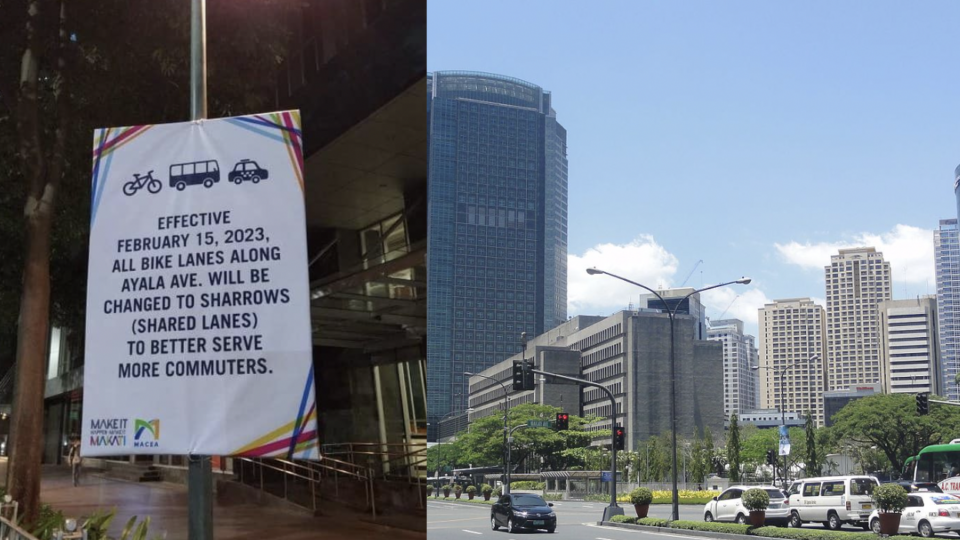Pedestrians and two-wheel riders banded together to protest Makati City’s decision to remove its highly praised protected bike lanes and replace them with sharrows or shared-lane markings.
Earlier this week, the city government announced it was changing all bike lanes along Ayala Avenue to the shared lanes “to better serve more commuters” — a statement that angered the cycling community and other actual commuters and stakeholders benefiting from the bike lanes.
Members of the commuting and riding public — including transport workers, commuters, and even persons with disabilities — condemned the act which they called “a massive step backward” in a united statement that opposed the city government’s decision.
“We stand united as ordinary citizens, car owners, commuters, transport workers, cyclists, electric kick scooters and active mobility users, delivery workers, office workers, motorcycle riders, pedestrians, health care workers, persons with disabilities, senior citizens, women, parents, children, teachers, students, and business owners,” it wrote.
The statement said the systemic removal of bike lanes across the country endangers not just the life of cyclists but all road users’. “The removal of what used to be the gold standard for protected bike lane width has dashed the hopes of many road users for safer streets in our cities,” it said.
“We refuse to be divided and pitted against each other. We want just one thing: to arrive at our destinations and come home safe. We want to have safer streets where any person can feel safe to walk, bike, go on a wheelchair, commute, and even drive safely. We need to exercise empathy with one another, so we can build a city that keeps us all safe,” the statement read.
The statement argued that installing protected bike lanes carried benefits for various kinds of commuters and motorists, not just cyclists.
“We car owners want safer streets… We recognize that we are just 6% of the country*, a privileged minority. But we car owners are cyclists, pedestrians, and commuters too, so
we understand how dangerous our streets are. We want slower, safer streets so that we don’t carelessly kill people in our haste to drive in needlessly wide roads,” it wrote.
The statement added that commuters and transport workers also needed and wanted properly designed public transport stops while reallocating road space for protecting bike lanes and walkways. “Removing bollards is a death sentence. There are design options to keep all of us safe and keep public transport moving without taking space away from our most vulnerable road users: cyclists, pedestrians, women, children, senior citizens, and persons with disabilities,” it said.
Cyclists, electric kick scooters, active mobility users, and delivery riders also said they needed wider protected lanes due to injuries and deaths from the lack of protected and well-maintained infrastructure. “We have needed to pay hospital bills because of injuries from potholes and being sideswiped by motor vehicles.”
Pedestrians also demanded wider walkways along with protected bike lanes. “Too often, we are treated like prisoners on a sliver of pavement, like the absurdly narrow MRT Ortigas walkway, a candidate for one of the worst pedestrian accesses in the world. Due to the inadequate and fragmented sidewalks, too often we are forced to walk on the bike lane, or worse, on the road, where we are at risk of getting in a road crash.”
Persons with disabilities and senior citizens demanded proper protected lanes, continuous pedestrian access, urban shade trees, accessible ramps, and at-grade crossings instead of inaccessible elevated footbridges. Meanwhile, students, teachers, youth groups, and children requested “bike parks, showers, slower streets, and safe crossings, so we can go to school safely and reclaim our streets for learning and play.”
Healthcare workers brought to light the epidemic of road crashes, cited as the top causes of death among Filipinos, especially children. Business owners argued that bicycles and pedestrians brought them good business.
The statement called on President Ferdinand Marcos Ir. and Vice President Sara Duterte to fulfill their campaign promise to make protected bike lanes permanent.
It also called on agencies such as the Department of Transportation (DOTr), the Department of Public Works and Highways (DPWH), the Metro Manila Development Authority (MMDA) and the Inter-Agency Technical Working Group on Active Transport (LATWG-AT) to enforce the National Transport Policy and President Marcos’s Philippine Development Plan 2023 to 2028, which call for the construction of active transport infrastructure that prioritizes pedestrians, cyclists, and commuters.




